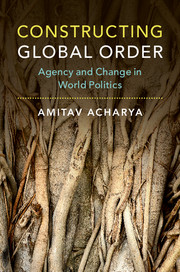
-
Select format
-
- Publisher:
- Cambridge University Press
- Publication date:
- 29 March 2018
- 22 March 2018
- ISBN:
- 9781316756768
- 9781107170711
- 9781316621783
- Dimensions:
- (228 x 152 mm)
- Weight & Pages:
- 0.45kg, 224 Pages
- Dimensions:
- (228 x 152 mm)
- Weight & Pages:
- 0.34kg, 224 Pages
- Subjects:
- Political Sociology, Politics and International Relations, International Relations and International Organisations, Sociology
You may already have access via personal or institutional login- Subjects:
- Political Sociology, Politics and International Relations, International Relations and International Organisations, Sociology
Book description
For a long time, international relations scholars have adopted a narrow view of what is global order, who are its makers and managers, and what means they employ to realize their goals. Amitav Acharya argues that the nature and scope of agency in the global order - who creates it and how - needs to be redefined and broadened. Order is built not by material power alone, but also by ideas and norms. While the West designed the post-war order, the non-Western countries were not passive. They contested and redefined Western ideas and norms, and contributed new ones of their own making. This book examines such acts of agency, especially the redefinitions of sovereignty and security, shaping contemporary world politics. With the decline of Western dominance, ideas and agency from the Rest may make it possible to imagine and build a truly global order.
Reviews
‘Amitav Acharya insists that global order constructions can be successful in a challenged world. But they must accept a past and a future marked by enduring contestations over an inescapably pluralist world. This gem of a book makes international relations theory speak directly to world politics.'
Peter J. Katzenstein - Cornell University, New York
'… well-crafted book … the vast majority of publications this book draws on originates in the Western academy … he makes a serious effort in defining what exactly this term is about - conceptually and not in its often-normative usage. As most of Acharya’s reasoning this is guided by a constructivist approach.'
Ulf Engel Source: Connections
Contents
Metrics
Altmetric attention score
Full text views
Full text views help Loading metrics...
Loading metrics...
* Views captured on Cambridge Core between #date#. This data will be updated every 24 hours.
Usage data cannot currently be displayed.
Accessibility standard: Unknown
Why this information is here
This section outlines the accessibility features of this content - including support for screen readers, full keyboard navigation and high-contrast display options. This may not be relevant for you.
Accessibility Information
Accessibility compliance for the PDF of this book is currently unknown and may be updated in the future.


